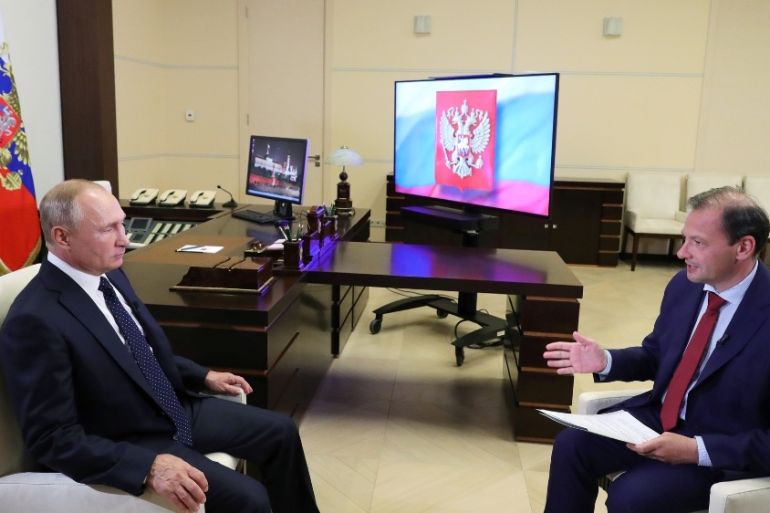Putin: Russian forces ready to enter Belarus to end protests
Russian leader says Lukashenko asked him to prepare a Russian law enforcement contingent to deploy to Belarus if needed.

Russian President Vladimir Putin has warned that he stands ready to send police to Belarus if protests there turn violent.
Speaking in an interview broadcast on Thursday, Putin said currently there was no such need and voiced hope for stabilising the situation in the neighbouring country.
Keep reading
list of 4 itemsPutin: Concert hall shooting is act of intimidation by Kyiv
How will the Moscow concert hall attack affect Putin?
Moscow theatre attack suspects show signs of beating in court
Belarus’s president for 26 years, Alexander Lukashenko, is facing weeks of protests against his re-election for a sixth term in the August 9 vote, which the opposition says was rigged.
Putin told Russia’s state television that Lukashenko has asked him to prepare a Russian law enforcement contingent to deploy to Belarus if necessary.
Putin said he and Lukashenko have agreed that “there is no such need now, and I hope there won’t be”.
“We have agreed not to use it until the situation starts spinning out of control and extremist elements acting under the cover of political slogans cross certain borders and engage in banditry and start burning cars, houses and banks or take over administrative buildings,” he said.
In an apparent jab at the West, which has condemned Lukashenko’s crackdown on protesters and urged him to launch a dialogue with the opposition, Putin accused unidentified foreign forces of trying to win political advantages from the turmoil in Belarus.
“They want to influence those processes and reach certain decisions, which they think conform with their political interests,” Putin said.
Western expansion fears
Russia sees the neighbour as a key bulwark against Western expansion and an important conduit for Russian energy exports.
The two countries have a union agreement envisaging close political, economic and military ties, and Lukashenko has relied on cheap Russian energy and other subsidies to keep Belarus’s Soviet-style economy afloat.
|
|
Despite the close cooperation, Russia-Belarus relations have often been strained by disputes.
Lukashenko has frequently played overtures to the West and accused Moscow of hatching plans to incorporate Belarus.
Just before the election, Belarus arrested 32 private Russian military contractors on charges of planning to stage riots.
Belarusian authorities released the men shortly after the vote in a bid to mend ties with the Kremlin amid rising Western criticism.
In the interview, Putin described the incident as a provocation by the Ukrainian and the US spy agencies, charging that they lured the Russians to travel to Belarus by promising them jobs in a third country and made the Belarusian authorities believe they had a mission to destabilise the country.
Seeking Moscow’s support, Lukashenko has cast the protests as part of a Western plot to weaken Russia.
‘Hybrid war’
On Thursday, he accused Belarus’s neighbours of open interference in its affairs with a push for new elections in what he described as a “hybrid war” and “diplomatic carnage”.
He charged that Poland was harbouring plans to take over the Grodno region on the border, saying that it prompted the deployment of additional Belarusian troops to the frontier.
Polish Prime Minister Morawiecki dismissed such claims last week, saying that Poland fully respects Belarus’s sovereignty.
On Thursday, Poland’s Ministry of Foreign Affairs summoned the Belarus ambassador to lodge a protest against the “unfounded accusations”.
“With regard to the repeated unfounded accusations from Belarus leaders towards Poland, the … Belarus ambassador [was] summoned to the [Ministry of Foreign Affairs] today at 1500 [hours],” Deputy Foreign Minister Marcin Przydacz said on Twitter.
The United States and the European Union have criticised the August 9 election that extended Lukashenko’s rule as neither free nor fair and encouraged Belarusian authorities to engage in a dialogue with the opposition.
The Belarusian leader, who has ruled the nation of 9.5 million with an iron fist since 1994, has dismissed the protesters as Western puppets and refused to engage in dialogue with the opposition, which is contesting his re-election to a sixth term.